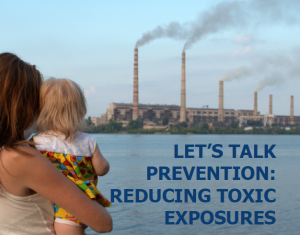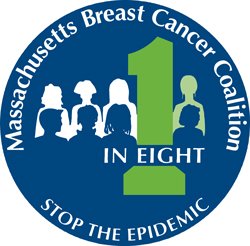 Living a healthy lifestyle through proper diet, exercise, and limiting alcohol and tobacco use is important, but these important health initiatives will not reduce the burden of environmentally linked diseases. Additional changes must be made to reduce exposure to chemicals linked with health consequences including cancer, birth defects, reproductive problems, and more. The Massachusetts Breast Cancer Coalition (MBCC) is helping facilitate the discussion between health professionals, patients, and concerned citizens about the reduction of toxic exposures. We are pleased to share with you our new toxic reduction medical program, Let’s Talk Prevention: Reducing Toxic Exposures.
Living a healthy lifestyle through proper diet, exercise, and limiting alcohol and tobacco use is important, but these important health initiatives will not reduce the burden of environmentally linked diseases. Additional changes must be made to reduce exposure to chemicals linked with health consequences including cancer, birth defects, reproductive problems, and more. The Massachusetts Breast Cancer Coalition (MBCC) is helping facilitate the discussion between health professionals, patients, and concerned citizens about the reduction of toxic exposures. We are pleased to share with you our new toxic reduction medical program, Let’s Talk Prevention: Reducing Toxic Exposures.
Let’s Talk Prevention: Reducing Toxic Exposures is an educational program designed for both health professionals and patients to increase discussions about environmental exposures and chemicals of concern. Many chemicals of concern are industrial chemicals that do not stay isolated inside factories. Studies have found hundreds of man-made chemicals in our air, water, food, and consumer products, as well as in samples of human blood and urine.
This program is designed to help prevent diseases, like breast cancer, by describing ways to avoid common chemicals of concern linked with negative health impacts. The goal of this program to reduce toxic exposures has implications for reducing the burden of all environmentally linked diseases, including breast cancer.
To help facilitate these discussions and make this important public health topic more palatable at your next doctor’s appointment, we have created a booklet for health professionals and a medical brochure for patients. These documents are available for download and are intended to be used in tandem.
How can you use the Let’s Talk Prevention: Reducing Toxic Exposures materials?
- As a healthcare professional, Let’s Talk Prevention: Reducing Toxic Exposures provides you with a wealth of resources to communicate with your patients, evaluate and assess your patients’ exposure history, and further understand the effects and impact of common chemicals of concern. Visit the health professionals section on our website, download the medical professionals booklet from that page, and help guide your patients to reduce toxic exposures.
- As an informed patient, Let’s Talk Prevention: Reducing Toxic Exposures enables you to manage your toxic exposure and start a dialogue with your health care provider as an informed patient. Visit the patient section of our website, download the patient medical brochure from that page, and learn basic steps to reduce your toxic exposures. Find practical tips that will help you choose safer alternatives to toxic products.
- As a concerned citizen, browse our interactive list of common chemicals of concern by name, review the sources of exposure, and find tips to avoid the most common chemicals.
Minimizing exposure to chemicals linked with negative health impacts can lessen the burden of disease and improve public health. We hope that our materials will enable you to have a productive conversation with your patients, with your health care provider, and in your community about reducing exposures.
For further information, please visit the Let’s Talk Prevention section on our website, where you can download our materials for health professionals and patients, review our tips for exposure reduction, and learn more about this important public health initiative facilitated by the Massachusetts Breast Cancer Coalition.


